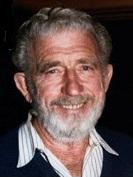(Died: January 22, 2012)
Physicist
Interests: Aether Age: 92
Steven Rado was born in 1920 in Hungary. In 1939 as a high school graduate he enrolled at the University of Budapest as a physics major. In the same year, forced by Nazi Germany, Hungary declared war on the United States and drafted all jewish and half-jewish men into army-controlled labor camps. Rado escaped from his camp and as an army deserter went underground, joining the Hungarian Liberation Movement.
Among other activities, he created a complete laboratory of document forging, helping hundreds of refugees and deserters to stay alive and fight. Surviving World War II during the short-lived democratic Hungary, he got married and worked as a journalist and playwrite.
His political and philosophical essays appeared in leading newspapers and magazines. In 1948, backed by the Russian army, a Communist dictatorship took over the government. His refusal to join the party cost him his livelihood in every direction. In subsequent years he worked for the state in a home-labor group and again joined the underground liberation movement, this time against the Russian occupation.
In 1956, during the days of the victorious Hungarian Revolution, he wrote, designed, printed and organized the distribution of the 'Liberation Daily' in the form of thousands of silk-screened posters. The revolution won, the Russian occupational army surrendered, but because of the lack of Western intervention, on November 4th, 1956, thousands of Russian tanks flooded the country and killed the revolution and the revolutionaries. On the 15th, at 4:15 AM, after 25 miles of walking and crawling through the border among the Russian tanks, he lead 35 freedom fighters and families to the free land of Austria. On December 11, 1956 Rado, his wife and his seven year old son arrived at Camp Kilmer, New Jersey. -- In 1962 they became US citizens.
From early studies of history, philosophy and political science, he became convinced that the gradual intellectual liberation of people is a direct function of the evolution of science and technology and thus depends on the level of understanding of physics. Hence, he spent most of the free moments of his adult life pursuing the accumulation of knowledge and the understanding of physics, and particularly its modern perplexities, postulated by relativity and quantum mechanics.
At the beginning of his life in the U.S., language barriers and financial burden obstructed him from gaining an official college education. Later on the financial ease of making a living in the U.S. rendered him sufficient free time for further self-education and research in physics.


